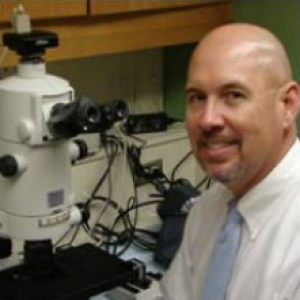Dr. Steven Hill
Professor and Edmond & Lily Safra Chair for Breast Cancer Research, Director, Tulane Center for Circadian Biology, Tulane Cancer Center Program Member, Director, Masters in Anatomy Program

Biography
In 1989 Dr. Hill joined Tulane University Health Sciences Center in the Department of Structural and Cellular Biology, where he is the course director for Medical Embryology. Dr. Hill has published over 60 manuscripts and book chapters in the area of molecular endocrinology and breast cancer. He is a reviewer for a variety of journals including Cancer Research, Breast Cancer Research and Treatment, and Molecular Endocrinology and has served on NIH, DOD, and NSF grant review panels. The primary focus of Dr. Hill's research is the molecular mechanisms of signal transduction cross- talk in breast cancer. Breast cancer is an endocrine-responsive neoplasm and as such is responsive to a variety of endocrine and growth factor stimuli. A complete understanding of the factors regulating the proliferation breast cancer, as well as an understanding of how these various hormones and factors cross-talk with each other to regulate breast cancer cell growth, is crucial to development of more potent breast cancer therapies. Dr. Hill's laboratory has conducted extensive studies examining the role of mutated estrogen receptors in the development of an estrogen-insensitive/tamoxifen-resistant phenotype in breast cancer. They have identified variant forms of the estrogen receptor that can function independent of hormone stimulation and can act to constitutively drive the mitogenic estrogen-response pathway in breast cancer. More recently, Dr. Hill's laboratory has demonstrated that the pineal hormone melatonin has significant inhibitory effects on the development and growth of human breast cancer. Furthermore, their studies have elucidated that melatonin can potentiate the actions of retinoic acid, a vitamin A derivative, to induce cell death in human breast tumor cells in culture, to prevent the development of carcinogen-induced breast cancer in rats and to induce the regression of over 70% of established breast tumors in rats. These studies currently are being moved into human clinical trials. Finally, Dr. Hill, in collaboration with investigators at Tulane Cancer Center and Xavier University, is examining the cross-talk of signaling pathways such as the melatonin receptor with the retinoic acid receptor and estrogen-receptor in both breast and prostate cancer and how these pathways can be manipulated to provide enhanced therapeutic advantage.
Education
University of Texas, Medical Center
University of Arizona
Abilene Christian University
Articles
Breast Cancer Incidence and Mortality by Molecular Subtype: Statewide Age and Racial/Ethnic Disparities in New Jersey
2019
The objective of this study was to assess breast cancer incidence and mortality rates by molecular subtype for cases diagnosed in New Jersey. Data on all primary, histologically confirmed, invasive breast cancers diagnosed among women between January 1, 2008 and December 31, 2013 were retrieved from the New Jersey State Cancer Registry.
Influence of Daytime LED Light Exposure on Circadian Regulatory Dynamics of Metabolism and Physiology in Mice
2019
Light is a potent biologic force that profoundly influences circadian, neuroendocrine, and neurobehavioral regulation in animals. Previously we examined the effects of light-phase exposure of rats to white light-emitting diodes (LED), which emit more light in the blue-appearing portion of the visible spectrum (465 to 485 nm) than do broad-spectrum cool white fluorescent (CWF) light, on the nighttime melatonin amplitude and circadian regulation of metabolism and physiology.
Community assessment to advance computational prediction of cancer drug combinations in a pharmacogenomic screen
2019
The effectiveness of most cancer targeted therapies is short-lived. Tumors often develop resistance that might be overcome with drug combinations. However, the number of possible combinations is vast, necessitating data-driven approaches to find optimal patient-specific treatments. Here we report AstraZeneca’s large drug combination dataset, consisting of 11,576 experiments from 910 combinations across 85 molecularly characterized cancer cell lines, and results of a DREAM Challenge to evaluate computational strategies for predicting synergistic drug pairs and biomarkers.
Epigenetic inhibition of the tumor suppressor ARHI by light at night‐induced circadian melatonin disruption mediates STAT3‐driven paclitaxel resistance in breast cancer
2019
Disruption of circadian time structure and suppression of circadian nocturnal melatonin (MLT) production by exposure to dim light at night (dLAN), as occurs with night shift work and/or disturbed sleep‐wake cycles, is associated with a significantly increased risk of breast cancer and resistance to tamoxifen and doxorubicin. Melatonin inhibition of human breast cancer chemoresistance involves mechanisms including suppression of tumor metabolism and inhibition of kinases and transcription factors which are often activated in drug‐resistant breast cancer.
Post-translational modifications of Beclin 1 provide multiple strategies for autophagy regulation
2018
Autophagy is a conserved intracellular degradation pathway essential for protein homeostasis, survival and development. Defects in autophagic pathways have been connected to a variety of human diseases, including cancer and neurodegeneration. In the process of macroautophagy, cytoplasmic cargo is enclosed in a double-membrane structure and fused to the lysosome to allow for digestion and recycling of material. Autophagosome formation is primed by the ULK complex, which enables the downstream production of PI(3)P, a key lipid signalling molecule, on the phagophore membrane. The PI(3)P is generated by the PI3 kinase (PI3K) complex, consisting of the core components VPS34, VPS15 and Beclin 1. Beclin 1 is a central player in autophagy and constitutes a molecular platform for the regulation of autophagosome formation and maturation. Post-translational modifications of Beclin 1 affect its stability, interactions and ability to regulate PI3K activity, providing the cell with a plethora of strategies to fine-tune the levels of autophagy. Being such an important regulator, Beclin 1 is a potential target for therapeutic intervention and interfering with the post-translational regulation of Beclin 1 could be one way of manipulating the levels of autophagy. In this review, we provide an overview of the known post-translational modifications of Beclin 1 that govern its role in autophagy and how these modifications are maintained by input from several upstream signalling pathways.
Media Appearances
How to ruin cancer’s day
But, says Steven Hill, a circadian cancer researcher at Tulane University, “there are no published studies or active interventional studies” to back that up.

